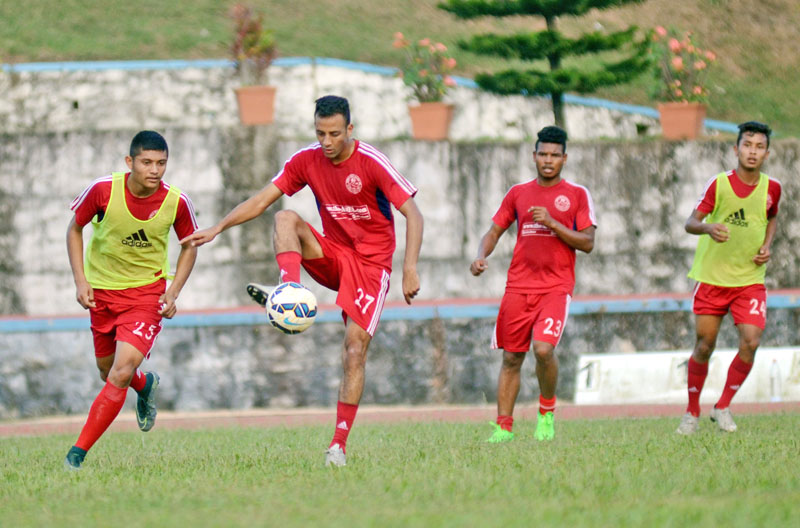Nepal’s early exit raises questions
Trivandrum, December 28
Nepal’s early exit from the ninth SAFF Championship has raised many questions — on players, coaching staff and the management.
Nepal were drawn in Group A along with India and Sri Lanka. Many had expected the team would reach semi-finals without much fuss, as they did in the previous two editions. But Nepal lost both matches and crashed out of the group stage for the first time since 2009. The team, however, ended goal drought finding the back of the nets after 1003 minutes.
The youthful Nepali squad clearly lacked in fitness. Only few players showed the stamina of playing for full 90 minutes, while the depleted defense line was too young to handle opponents’ pressure. On the other hand, midfielders and forward line showed rays of hope for the future. If national team head coach Patrick Aussems is to be believed, he is preparing the team for future. But the team does not have international fixture for another two years, except for the friendly matches, if arranged.
ANFA Development Director Sanjib Mishra agreed the players lacked in fitness because of the new playing style introduced by coach Aussems. The Belgian coach opted to 4-3-3 formation changing the traditional 4-4-2. “We have been playing in 4-4-2 formation for the last two decades and it is not easy to transform to new playing style,” he said. According to him, it needs a lot of energy to play in the new formation. “The new playing style is one of the reasons of our early exit as players need to have a good fitness level for that formation.”
Out of the five goals Nepal conceded in two matches, the defenders’ errors contributed for three. The match against Sri Lanka proved vital at the end as at least a draw against the Islanders would have sent Nepal into the semi-finals. A defensive blunder allowed Sri Lanka score in the injury time and that goal prevented Nepal’s progress. Against India, it was the defense line that failed to stop the opponents from scoring the equaliser and against contributed in second goal.
Already weakened by the suspension of Sagar Thapa and Sandip Rai, the defense line seemed to have lacked experience although Biraj Maharjan led the troop. And to add to the woes, coach Aussems kept dependable Robin Shrestha on the bench giving opportunities to fresh legs — Jitendra Karki, Aditya Chaudhary and Ranjit Dhimal. “We were playing together for the first time and I had to lead the back line as a central defender,” said Maharjan.
Strategic failure also contributed to Nepal’s early exit from the tournament. If we are to borrow coach Aussems’ words, the team was playing first final against Sri Lanka. Going for a victory is not bad but the idea of taking at least a point from that match would have been better. The coaching staff that included Aussems and three former national team skippers in Upendra Man Singh, Bal Gopal Maharjan and Hari Khadka failed in calculation. They failed to presume that India would beat Sri Lanka. In that case, Nepal would not have been in do-or-die situation against the hosts and that they need not to go for outright victory in their desperate bid to make it to the semi-finals.
Nepal also failed in management part as ANFA did not give much time for the team. Despite repeated requests of coach Aussems, the football governing body failed to arrange natural pitch for training and practice matches. Nepali players trained on Astro-turf at ANFA Complex and went into the tournament with just one friendly match, against Bangladesh in Dhaka. The national team preparation did not fall under ANFA’s priorities, may be because of the off-field controversies — match-fixing scandal and suspension of president Ganesh Thapa.
Not everything is negative though. The youthful squad played technical game and built the match with short passes that allowed the team to dominate in ball possession. The forward and midfielders showed that they can pose a threat in South Asian football and have built confidence. Once the players are used to with the formation, they are not too far away from winning matches.






